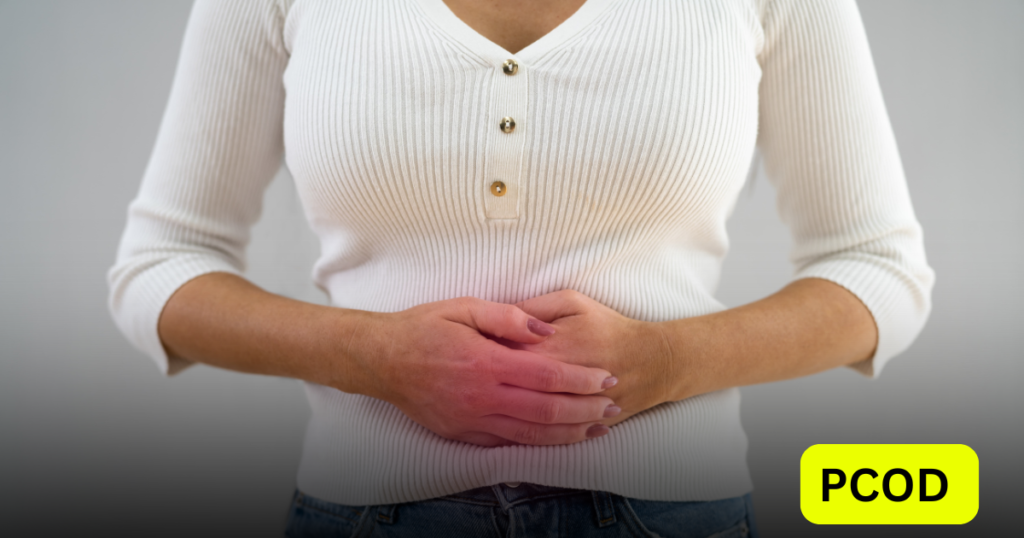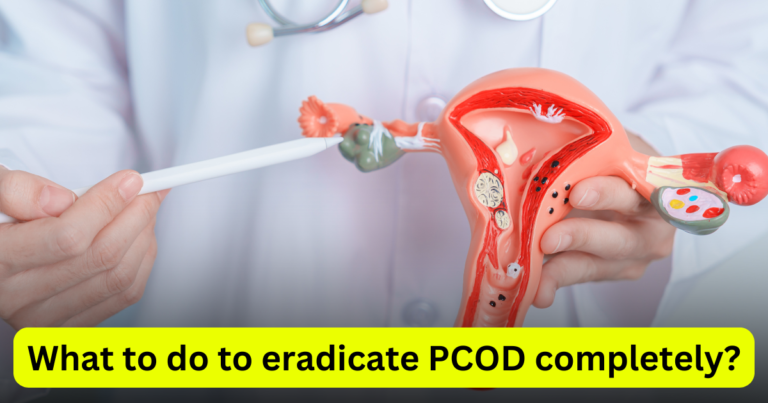Polycystic Ovarian Disease (PCOD) is a hormonal disorder that affects many women during their reproductive years. While it can be managed effectively, there is no guaranteed method to completely eradicate it. However, a combination of lifestyle changes, medical treatments, and natural remedies can significantly reduce symptoms and improve overall health. Here’s a comprehensive approach to managing and potentially reversing PCOD symptoms.

1. Adopt a Balanced Diet
Diet plays a crucial role in managing PCOD. Opt for a diet rich in whole grains, fruits, vegetables, and lean proteins. Avoid processed foods, sugary snacks, and high-carb meals. A low glycemic index (GI) diet helps regulate blood sugar levels, reducing insulin resistance, which is common in women with PCOD.
- High-Fiber Foods: Include leafy greens, oats, and beans.
- Healthy Fats: Choose nuts, seeds, and olive oil to reduce inflammation.
2. Exercise Regularly
Physical activity is essential in managing PCOD. Regular exercise improves insulin sensitivity and helps in weight management, both of which are crucial for PCOD management. Aim for at least 150 minutes of moderate-intensity exercise per week, including both aerobic activities and strength training.
3. Maintain a Healthy Weight
Even a 5% weight loss can significantly improve symptoms of PCOD by regulating the menstrual cycle and improving insulin sensitivity. A healthy weight can reduce excess androgen levels and improve fertility in women with PCOD.
4. Manage Stress
Chronic stress can worsen PCOD symptoms by increasing cortisol levels, which in turn affects insulin resistance. Stress-reduction techniques such as meditation, yoga, and deep breathing exercises can be beneficial in managing PCOD.
5. Hormonal Therapy
For some women, birth control pills or other hormonal treatments may be prescribed to regulate menstrual cycles and reduce symptoms like acne and excess hair growth. Hormonal therapy helps manage the hormonal imbalances that are at the root of PCOD.
6. Use Insulin-Sensitizing Medications
Medications such as metformin can be used to improve insulin sensitivity and regulate blood sugar levels. This can help in controlling the hormonal imbalances that cause PCOD symptoms and may aid in weight management.
7. Fertility Treatments (If Needed)
For women facing infertility due to PCOD, treatments like ovulation induction or assisted reproductive technologies may be necessary. Drugs like clomiphene or letrozole may be prescribed to stimulate ovulation.
8. Natural Supplements
Certain supplements have been found to help in managing PCOD symptoms. These include:
- Inositol: Helps improve insulin sensitivity and ovarian function.
- Vitamin D and Calcium: Low levels of vitamin D are common in women with PCOD and supplementation can help regulate the menstrual cycle.
- Omega-3 Fatty Acids: These reduce inflammation and insulin resistance.
9. Monitor Mental Health
Women with PCOD are at a higher risk of anxiety and depression. Mental health support, counseling, and managing emotional well-being should be an integral part of PCOD management.
10. Consult a Doctor Regularly
Regular medical check-ups are essential for monitoring PCOD symptoms, hormone levels, and any associated conditions like diabetes or heart disease.
Read More
Heatstroke: Causes, Symptoms, Treatment, and Prevention
FAQs about Eradicating PCOD
- Can PCOD be completely cured? No, PCOD cannot be completely cured, but it can be managed effectively with lifestyle changes, medications, and natural remedies.
- What foods should I avoid if I have PCOD? Avoid processed foods, sugary drinks, refined carbohydrates, and trans fats. Opt for a low glycemic index diet rich in fiber and lean proteins.
- Is exercise necessary for managing PCOD? Yes, regular physical activity is crucial for managing insulin resistance and maintaining a healthy weight, both of which are key to controlling PCOD symptoms.
- Can I get pregnant with PCOD? Yes, many women with PCOD can conceive with the help of lifestyle changes, medications, or fertility treatments.
- How does stress affect PCOD? Stress increases cortisol levels, which can worsen insulin resistance and exacerbate PCOD symptoms. Managing stress is essential for controlling PCOD.
- What supplements are good for PCOD? Supplements like inositol, vitamin D, calcium, and omega-3 fatty acids may help manage PCOD symptoms by improving insulin sensitivity and reducing inflammation.
- What is the difference between PCOD and PCOS? While both conditions involve ovarian cysts, PCOD refers to the development of immature eggs that form cysts, while PCOS is a hormonal disorder that causes excess production of male hormones and more severe symptoms.
- Can losing weight help with PCOD? Yes, losing even a small percentage of body weight can help regulate your menstrual cycle, improve fertility, and reduce insulin resistance.
- How does hormonal therapy help with PCOD? Hormonal therapy can regulate menstrual cycles, reduce androgen levels, and alleviate symptoms like acne and excess hair growth.
- What are the long-term health risks associated with PCOD? Untreated PCOD can increase the risk of type 2 diabetes, high blood pressure, heart disease, and endometrial cancer. Managing the condition early is key to reducing these risks.
By integrating healthy lifestyle choices, medications, and natural remedies, women can manage and significantly improve their PCOD symptoms, leading to a better quality of life. However, early diagnosis and regular medical consultations are vital in preventing long-term complications.

